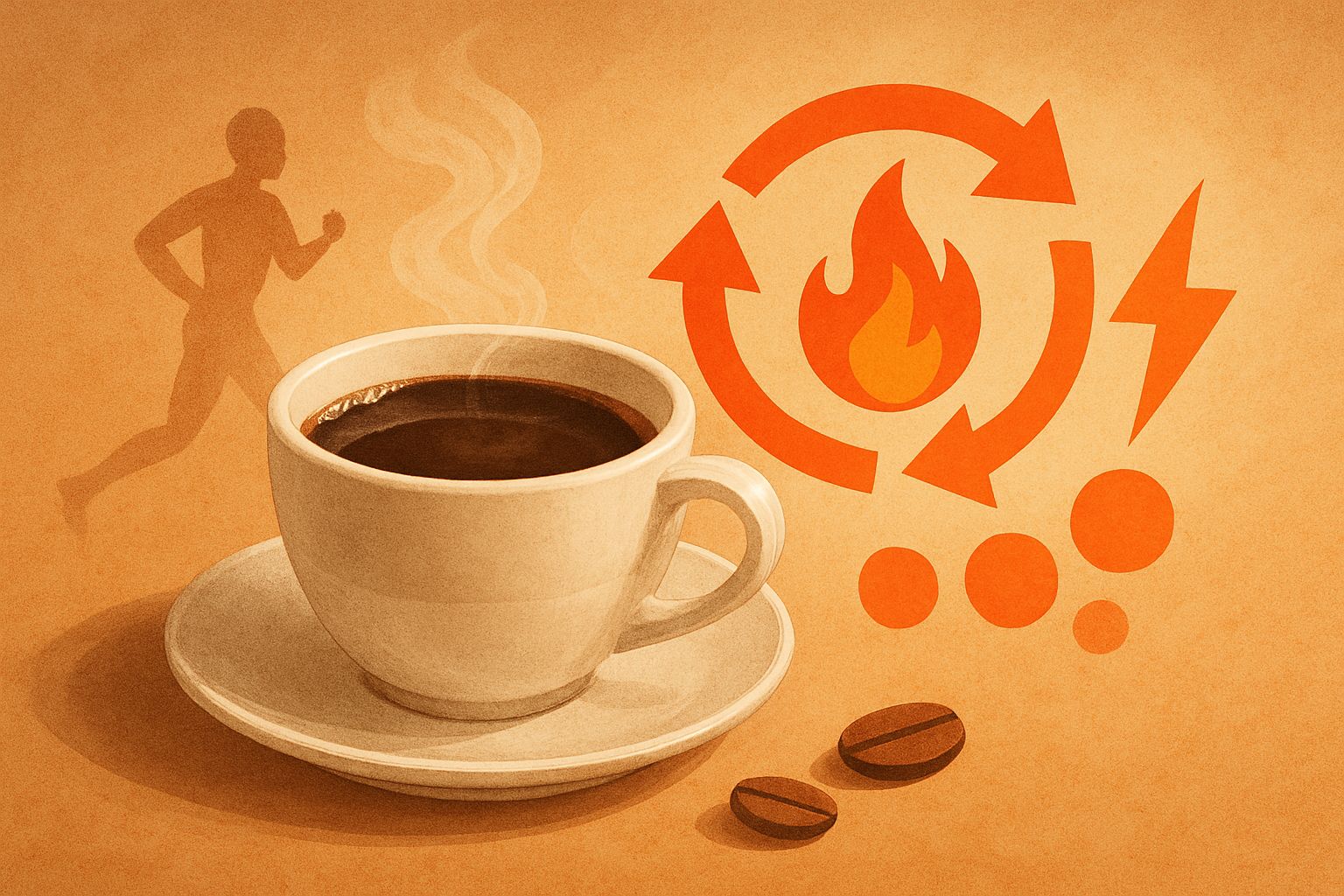Caffeine and metabolic processes - what are the relationships?

Boosting metabolism with supplements is a very common occurrence during weight loss. After all, we want to see results as quickly as possible. Caffeine as a thermogenic is the most commonly used ingredient in fat burners. It is usually used in the maximum possible doses allowed by the regulations. Why? It is one of the few substances that clearly improve weight loss and can actually accelerate the results.
From this article you will learn about the effects of caffeine on metabolism and weight loss. Read to the end!
- Does caffeine help burn fat?
- Caffeine increases diuresis
- During weight loss, it is worth taking caffeine before training
- Summary
Does caffeine help burn fat?
If the inclusion of caffeine is the only treatment, it probably won't do anything. However, if it is a tool to support diet and activity, then caffeine can help as much as possible. And in several ways. A 2019 meta-analysis that analyzed the results of 13 human studies found that caffeine consumption can promote reductions in body weight, BMI and body fat.
Reduced fatigue means more activity and more energy consumption
Often we consume coffee or caffeine precisely to gain more power for activity. With caffeine, there is a greater chance of doing a harder workout or a greater level of spontaneous physical activity. After all, when we push away fatigue, there's a greater chance of doing something around the house or going for a walk, for example, rather than lying idle on the couch. More daily activity means more energy expenditure, and thus a more efficient reduction.
Caffeine can reduce appetite
This is a characteristic effect for most stimulants. It is known that better appetite control means easier maintenance of dietary rigor and negative caloric balance. A negative balance is necessary for fat burning. At the same time, people with excess body weight often have eating habits that they have to deviate from during weight loss in order not to overdo the calories. This is a challenge for many people, which is why appetite suppressant supplements are in such high demand. Few of them are effective, but caffeine in practice gets great feedback from users.
Biochemical effects on lipolysis
Caffeine is one of the most popular thermogenics, that is, substances that increase heat production in the body. This heat comes from burning energy.
Particularly in higher doses, caffeine has the effect of inhibiting phosphodiesterases (PDEs). These enzymes break down cAMP inside cells, among other things, so taking caffeine protects cAMP from excessive breakdown. Greater availability of cAMP, in turn, is an increase in the activity of hormone-sensitive lipase (HSL), which initiates lipolysis, among other things, mediated by adrenaline.
The increase in the rate of fatty acid oxidation due to caffeine supplementation is something that is definitely useful in the course of reducing excessive body fat.
What to combine caffeine with during weight loss?
There are many substances that work well with caffeine as part of metabolism support. Ingredients worth noting, which we also often see together with caffeine in fat burners' formulations, include:
- EGCG from green tea
- capsaicin from red peppers
- piperine from black pepper
- synephrine from bitter orange
- forskolin from Indian nettle
- Fucoxanthin from undaria pinnatifera
Caffeine increases diuresis
This aspect is worth keeping in mind. Caffeine is a diuretic - it increases sweating and the frequency of urination. On a daily basis, when consuming caffeine, it is worth taking care of increased water supply to compensate for the loss.
Sometimes, however, the diuretic effect is used intentionally. An example is when you need to highlight the details of your figure as much as possible for a short period of time, such as before a figure sports competition or before an important photo shoot. Such deliberate diuresis is a complicated process and should only be carried out by people who have a proper understanding of it.
During weight loss, it is worth taking caffeine before training
Caffeine has an ergogenic effect. This means that it improves athletic performance. This is due to, among other things:
- effect on the central nervous system and shifting the fatigue threshold,
- effects on adenosine receptors in muscles,
- modulation of muscle contraction strength due to mobilization of intracellular calcium.
By using caffeine before training, we are able to do a much better workout. With it, for example, you can run at a faster pace, do a few extra repetitions at the gym, or cycle more miles. Caffeine can support almost any physical activity.
As mentioned earlier, more physical activity means more energy expenditure. Caffeine-assisted workouts provide a much stronger stimulus, can burn more calories and cause more micro-damage to the muscles, which, as they regenerate, will continue to expend energy for hours after the workout.
It is worth mentioning that the psychoactive effect of caffeine simply makes it easier and more enjoyable to perform workouts. Thus, it is possible to stick to resolutions and the established training plan more easily.
Summary
Unless there are clear health contraindications, caffeine is definitely worth consuming during weight loss. As long as it is one of the elements of a weight loss strategy and not the only change made, you can expect a satisfactory effect on metabolism and a smoother and more enjoyable weight loss. In addition to improving body shape, caffeine's effect on metabolism also promotes overall health. Obesity and metabolic disorders lead to diseases such as type II diabetes, cardiovascular disease, and various types of cancer, so it is worthwhile to ensure a healthy body composition and continuous support of metabolic function.
Sources:
 ⮜ Previous article
⮜ Previous article
Kanna and cigarette smoking - what are the correlations?
 Next article ⮞
Next article ⮞